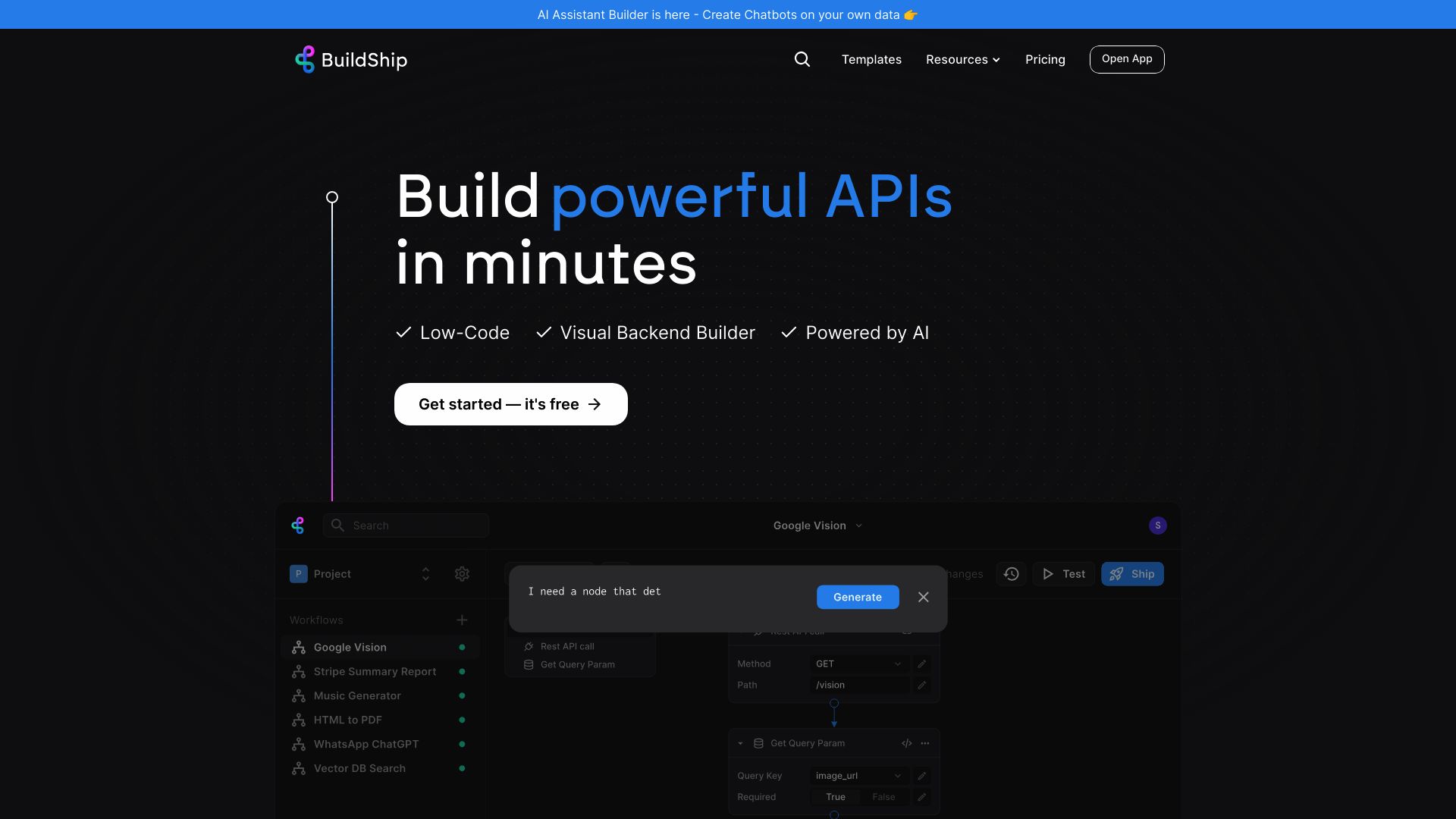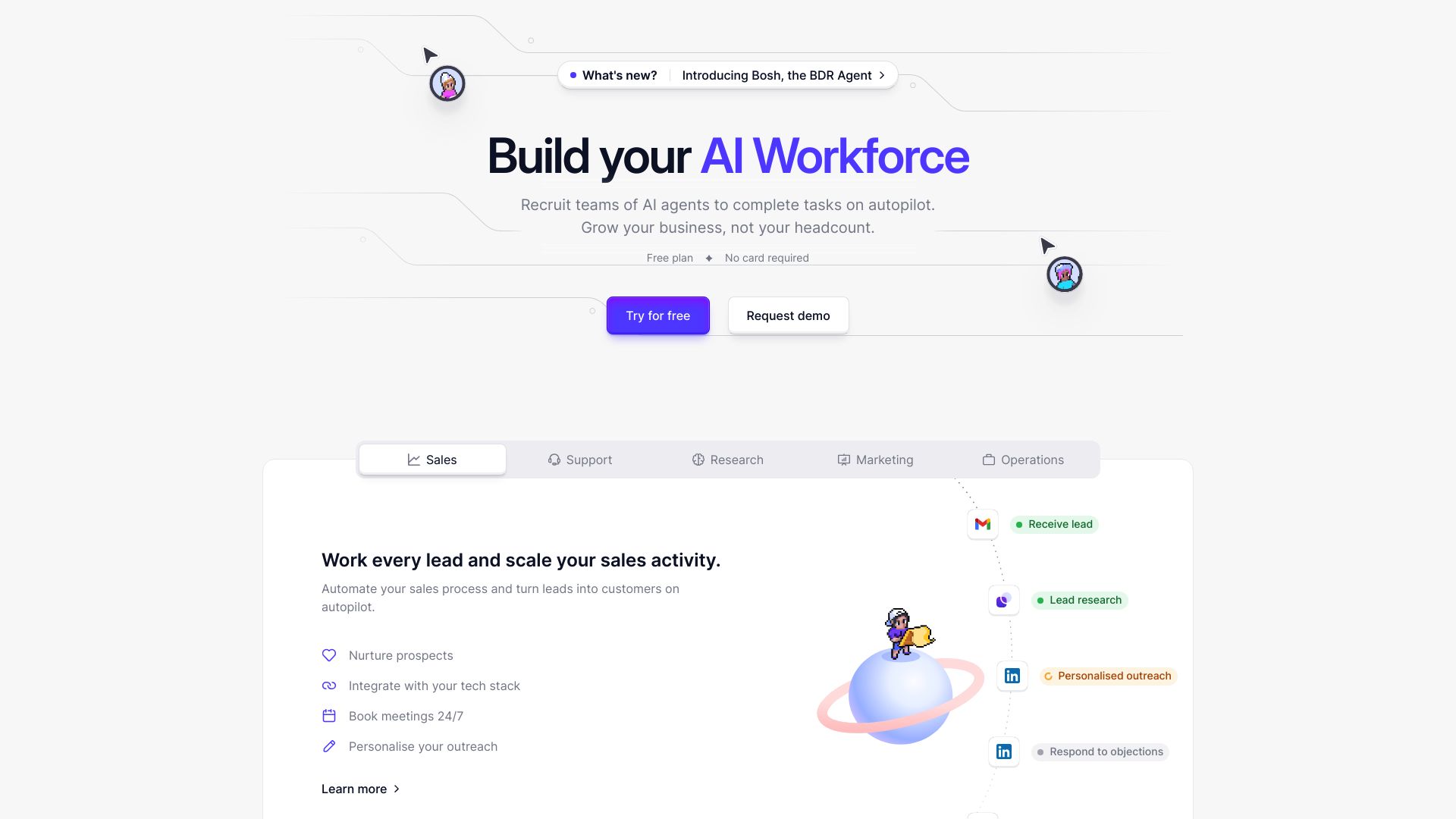BuildShip vs. Relevance AI: Comparing AI Development Platforms
AI development platforms revolutionize how businesses create and deploy intelligent solutions. BuildShip vs. Relevance AI offer powerful tools for workflow automation and AI integration, each with unique strengths. BuildShip’s visual no-code approach simplifies backend development, while Relevance AI specializes in LLM-powered agents.
This comparison explores their key features, capabilities, and limitations, highlighting how SmythOS emerges as a superior alternative. We’ll examine how each platform addresses critical needs in modern AI development, from ease of use to advanced security measures, helping you make an informed decision for your AI initiatives.
BuildShip Overview
BuildShip revolutionizes backend development with its visual no-code platform for building, testing, and deploying workflows and APIs. The platform empowers developers and non-technical users alike to create scalable solutions quickly and efficiently.


BuildShip features a drag-and-drop workflow builder with prebuilt nodes and AI-generated custom nodes. Users can integrate various data sources, APIs, and AI models to create complex workflows. The platform supports writing custom logic in JavaScript or TypeScript, offering flexibility for more advanced users.
Key features include a robust testing environment for individual nodes and entire workflows, allowing for iterative development. BuildShip enables deployment of workflows as production-grade APIs, seamlessly integrating into existing applications. The platform also supports scheduled workflows for automated tasks.
BuildShip revolutionizes backend development with its visual no-code platform for building, testing, and deploying workflows and APIs.
BuildShip enhances productivity with AI-powered features like autofill for inputs using natural language prompts. A template library accelerates development, while secure storage for API keys and secrets ensures data protection. The platform’s AI integration capabilities stand out, supporting models like ChatGPT and Stable Diffusion.
While BuildShip excels in many areas, it lacks some advanced features like hosted vector databases or specialized crawlers for sitemaps or YouTube transcripts. The platform also doesn’t offer specific support for PDF or Word file processing, which might limit some use cases.
BuildShip’s scalability, built on Google Cloud Platform, ensures that workflows and applications can handle increasing demands. The platform’s collaborative features, including support for multiple projects and version control, make it suitable for team environments.
Relevance AI Overview
Relevance AI transforms AI development with its low-code platform for building and deploying Large Language Model (LLM)-powered AI agents and tools. The platform caters to users across technical spectrums, enabling rapid creation of advanced AI solutions without extensive programming expertise.
Relevance AI emphasizes flexibility and efficiency in AI development. Its multi-provider support allows seamless integration and switching between various LLM providers, adapting to evolving project needs. The platform’s built-in vector store enhances data handling, while the ’Magic Deployment’ feature streamlines the process of deploying LLM features, eliminating infrastructure concerns.
Relevance AI transforms AI development with its low-code platform for building and deploying Large Language Model (LLM)-powered AI agents and tools.


Key offerings include customizable AI agents, AI-powered tools for data analysis and task automation, and ready-to-use templates for common tasks. These features empower businesses to enhance workflows and achieve greater efficiency through intelligent automation and data handling.
While Relevance AI excels in providing a user-friendly platform for AI development, it may face challenges in highly specialized or complex AI applications that require extensive customization beyond its pre-built components. The platform’s focus on accessibility could potentially limit its appeal to advanced users seeking granular control over AI model architecture.
Relevance AI integrates smoothly with existing systems, supporting various data formats and offering robust data processing capabilities. This versatility positions it as a valuable tool for businesses looking to incorporate AI into their operations without overhauling existing infrastructure. The platform’s vision of democratizing access to advanced AI technologies aligns with the growing demand for accessible yet powerful AI solutions across industries.
Feature Comparison
BuildShip and Relevance AI offer distinct approaches to AI development, with notable differences in their core components and security features. BuildShip excels in providing a visual no-code platform for creating backend workflows and APIs, emphasizing ease of use for developers of all skill levels. Its drag-and-drop interface and AI-powered node creation simplify complex tasks, making it accessible to a broader audience. However, BuildShip lacks some advanced features in data handling and specialized AI capabilities.
Relevance AI, on the other hand, focuses on LLM-powered AI agents and tools, offering a more specialized platform for AI development. Its multi-provider support and built-in vector store provide flexibility in working with various AI models and efficient data handling. Relevance AI’s ’Magic Deployment’ feature streamlines the process of deploying LLM features, addressing a key pain point in AI development. However, it may not offer the same level of visual workflow building as BuildShip.
In terms of security, both platforms prioritize data protection, but their approaches differ. BuildShip uses Google Cloud Secret Manager for securing API keys and secrets, indicating robust data encryption capabilities. Relevance AI’s security features are less explicitly detailed, but as an AI-focused platform, it likely incorporates necessary security measures for handling sensitive AI model data. Neither platform stands out significantly in terms of advanced security features like constrained alignment or IP control, areas where SmythOS excels with its comprehensive security approach.
Feature Comparison Table
| BuildShip | Relevance AI | SmythOS | |
|---|---|---|---|
| CORE FEATURES | |||
| Memory & Context | ❌ | ✅ | ✅ |
| Autonomous Agents | ❌ | ✅ | ✅ |
| Explainability & Transparency | ❌ | ❌ | ✅ |
| Multimodal | ❌ | ✅ | ✅ |
| Problem-Solving Capabilities | ❌ | ✅ | ✅ |
| Multi-Agent Collaboration | ❌ | ❌ | ✅ |
| Human-AI Interaction | ❌ | ✅ | ✅ |
| Audit Logs for Analytics | ❌ | ❌ | ✅ |
| Work as Team | ❌ | ❌ | ✅ |
| SECURITY | |||
| Constrained Alignment | ❌ | ❌ | ✅ |
| IP Control | ✅ | ❌ | ✅ |
| COMPONENTS | |||
| Foundation AIs | ❌ | ✅ | ✅ |
| Huggingface AIs | ❌ | ❌ | ✅ |
| Zapier APIs | ❌ | ❌ | ✅ |
| Classifiers | ❌ | ✅ | ✅ |
| Data Lakes | ❌ | ❌ | ✅ |
| DEPLOYMENT OPTIONS (EMBODIMENTS) | |||
| Staging Domains | ❌ | ✅ | ✅ |
| Production Domains | ❌ | ✅ | ✅ |
| Deploy as Site Chat | ❌ | ✅ | ✅ |
| Deploy as GPT | ❌ | ✅ | ✅ |
| DATA LAKE SUPPORT | |||
| Hosted Vector Database | ❌ | ✅ | ✅ |
| Sitemap Crawler | ❌ | ❌ | ✅ |
| YouTube Transcript Crawler | ❌ | ✅ | ✅ |
| URL Crawler | ❌ | ❌ | ✅ |
| PDF Support | ❌ | ✅ | ✅ |
| Word File Support | ❌ | ✅ | ✅ |
| TXT File Support | ❌ | ✅ | ✅ |
Best Alternative to BuildShip and Relevance AI
SmythOS emerges as the superior alternative to BuildShip and Relevance AI for agentic AI automation. Our platform offers unparalleled ease of use, an extensive feature set, and unlimited use cases. SmythOS excels where BuildShip and Relevance AI fall short. We provide robust memory and context capabilities, enabling agents to maintain coherent, long-term interactions. Our autonomous agents operate independently, solving complex problems without constant human oversight. SmythOS also offers unmatched explainability and transparency, critical for building trust in AI systems.
Unlike our competitors, we support true multi-agent collaboration, allowing teams of AI agents to work together seamlessly. SmythOS delivers enterprise-grade security with constrained alignment and comprehensive audit logs. Our platform integrates with a vast ecosystem of AI models, APIs, and data sources, providing unmatched flexibility. From drag-and-drop visual builders to advanced deployment options, SmythOS empowers users to create and manage sophisticated AI agents for any application. With SmythOS, we’ve eliminated the limitations holding back AI development, enabling unprecedented innovation and efficiency across industries.
SmythOS emerges as the superior alternative to BuildShip and Relevance AI for agentic AI automation. Our platform offers unparalleled ease of use, an extensive feature set, and unlimited use cases.
Conclusion
BuildShip and Relevance AI offer powerful solutions for workflow automation and AI development, each with unique strengths. BuildShip excels in visual no-code development for backend processes, while Relevance AI focuses on LLM-powered AI agents. Both platforms democratize access to advanced technologies, but SmythOS emerges as the superior choice for comprehensive AI development and deployment.
SmythOS combines the best of both worlds, offering a visual builder for creating complex AI workflows and supporting a wide range of AI models and integrations. Its ’Create Once, Deploy Anywhere’ philosophy, coupled with features like multi-agent collaboration and advanced security measures, sets it apart in versatility and scalability.
Unlike its competitors, SmythOS provides a holistic ecosystem for AI development, from ideation to production. Its extensive integration capabilities, support for multimodal interactions, and robust deployment options make it suitable for businesses of all sizes and technical expertise levels. The platform’s emphasis on explainability, debugging, and seamless API integrations addresses critical needs in modern AI development.
For those looking to harness the full potential of AI in their operations, SmythOS offers a compelling starting point. With its diverse range of AI-powered agent templates and flexible deployment options, SmythOS empowers users to create sophisticated AI solutions tailored to their specific needs. We invite you to explore how SmythOS can transform your approach to AI development and automation.
Last updated:
Disclaimer: The information presented in this article is for general informational purposes only and is provided as is. While we strive to keep the content up-to-date and accurate, we make no representations or warranties of any kind, express or implied, about the completeness, accuracy, reliability, suitability, or availability of the information contained in this article.
Any reliance you place on such information is strictly at your own risk. We reserve the right to make additions, deletions, or modifications to the contents of this article at any time without prior notice.
In no event will we be liable for any loss or damage including without limitation, indirect or consequential loss or damage, or any loss or damage whatsoever arising from loss of data, profits, or any other loss not specified herein arising out of, or in connection with, the use of this article.
Despite our best efforts, this article may contain oversights, errors, or omissions. If you notice any inaccuracies or have concerns about the content, please report them through our content feedback form. Your input helps us maintain the quality and reliability of our information.
